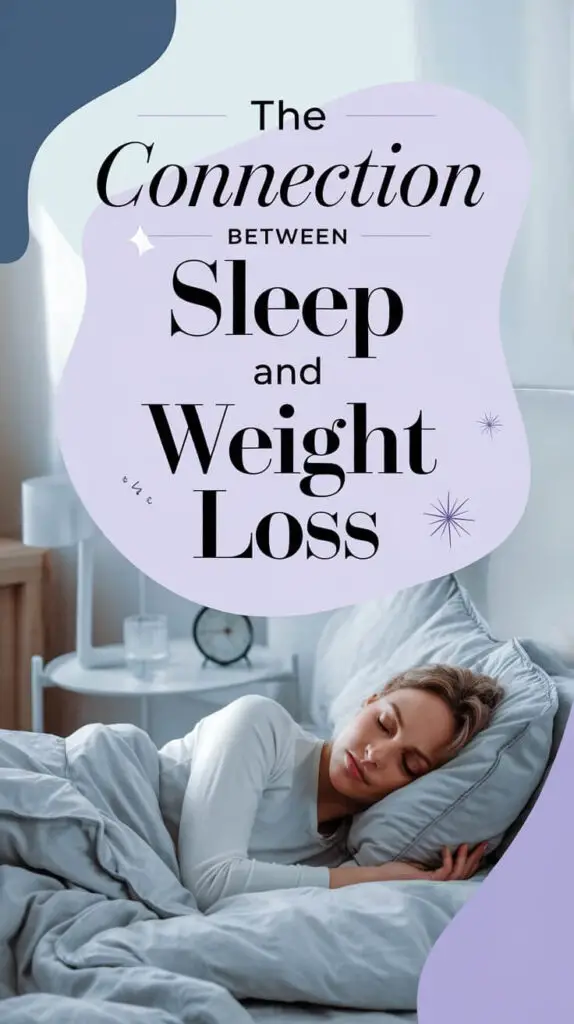If you are struggling with weight loss despite eating well and exercising regularly, you might be overlooking an important factor—sleep. We all know that getting a good night’s rest is essential for our overall health, but did you know that sleep plays a crucial role in your weight loss journey? In this article, I’m going to share how sleep affects weight loss based on my own experience and why it might just be the missing piece in your weight loss puzzle.

How Sleep Affects Weight Loss
For many years, I focused heavily on my diet and exercise routine, believing those were the only factors influencing my weight loss. But when progress seemed slow, I began to wonder if there was something I was missing. After doing some research and reflecting on my habits, I realized that sleep, or rather the lack of it, was one of the main reasons I wasn’t seeing the results I wanted.
When I started prioritizing my sleep, I began to notice a big difference in my energy levels, appetite, and overall ability to stay on track with my weight loss goals. But how exactly does sleep impact weight loss? Let’s dive into it.
1. Hormones That Control Hunger
One of the most significant ways sleep affects weight loss is through the regulation of hormones that control hunger. Two hormones are particularly important in this regard: ghrelin and leptin.
-
Ghrelin is known as the “hunger hormone.” It stimulates appetite and tells your brain that it’s time to eat. When you don’t get enough sleep, your body produces more ghrelin, making you feel hungrier than usual.
-
Leptin, on the other hand, is the hormone that signals to your brain that you’re full. Poor sleep decreases leptin levels, so even when you eat, you might still feel hungry.
I noticed that on nights when I didn’t sleep well, I woke up feeling extra hungry. As a result, I would end up snacking more throughout the day, which led to overeating. By getting enough sleep, I was able to keep both of these hormones in balance, making it easier to control my hunger and stick to my healthy eating habits.
2. Metabolism and Fat Storage
When you’re well-rested, your metabolism functions more efficiently, meaning you burn calories more effectively. However, lack of sleep can disrupt your metabolism, leading to weight gain or difficulty losing weight. This is because sleep deprivation triggers the release of cortisol, the stress hormone.
Cortisol can cause your body to store more fat, especially around the abdominal area. I experienced this firsthand. During stressful periods when I wasn’t getting enough sleep, I noticed that I would often gain weight around my midsection. Once I started prioritizing sleep and managing stress better, I found it easier to lose those stubborn pounds.
3. Energy Levels for Exercise
When I was sleep-deprived, I often found it difficult to find the energy to work out, no matter how motivated I was. I would skip my morning runs or evening gym sessions, telling myself that I was too tired. But this lack of exercise only contributed to my sluggish metabolism and made it even harder to shed pounds.
Good quality sleep boosts your energy levels and helps your body recover after workouts. It’s no surprise that when I started sleeping better, my workouts became more effective. I had more strength, endurance, and focus during exercise, which ultimately helped me burn more calories and lose weight faster.
4. Insulin Sensitivity and Blood Sugar Regulation
Another way sleep affects weight loss is through its impact on insulin sensitivity. Insulin is a hormone that helps regulate your blood sugar levels. Poor sleep can lead to insulin resistance, where your body’s cells become less responsive to insulin. This can result in higher blood sugar levels and increased fat storage.
When I wasn’t getting enough rest, I found that my energy would crash after meals, leaving me craving sugary snacks for a quick pick-me-up. These food choices were often not the best for my weight loss goals. However, after improving my sleep habits, I noticed fewer cravings and more stable energy throughout the day, which made it easier to stick to my healthy eating plan.
5. Sleep Deprivation Leads to Poor Food Choices
When you’re sleep-deprived, your brain’s ability to make smart food choices is impaired. Studies have shown that sleep deprivation activates the brain’s reward centers, making high-calorie, unhealthy foods more appealing. This means that after a bad night’s sleep, you may be more likely to reach for sugary or greasy foods, which can sabotage your weight loss efforts.
I experienced this myself, particularly during stressful weeks when I didn’t get enough sleep. I would crave chips, chocolate, and other comfort foods, even though I knew they weren’t good for me. By getting enough sleep, I felt more in control of my food choices and found it easier to stick to my healthy eating habits.
How Much Sleep Do You Really Need?
So, how much sleep should you be getting for optimal weight loss? Experts generally recommend that adults get between 7-9 hours of sleep each night. However, the quality of your sleep matters just as much as the quantity. It’s not just about how long you sleep; it’s about getting restful, uninterrupted sleep that allows your body to repair, recover, and regulate hormones.
When I made sleep a priority, I started going to bed earlier and creating a more relaxing bedtime routine. This allowed me to fall asleep faster and wake up feeling more refreshed. I also avoided caffeine and heavy meals before bedtime, which helped improve the quality of my sleep.
Tips for Improving Sleep to Support Weight Loss
If you’re struggling to get enough sleep, here are some tips that helped me:
-
Create a bedtime routine: Engage in calming activities before bed, such as reading, meditation, or gentle stretching.
-
Limit screen time: Avoid looking at your phone, tablet, or computer at least an hour before bed. The blue light emitted from screens can interfere with your body’s production of melatonin, a hormone that helps regulate sleep.
-
Make your sleep environment comfortable: Keep your bedroom cool, dark, and quiet. Consider investing in a comfortable mattress and pillows to ensure restful sleep.
-
Exercise regularly: Physical activity during the day can help you fall asleep faster and sleep more deeply. Just be sure not to exercise too close to bedtime, as it can be stimulating.
-
Stick to a consistent sleep schedule: Try to go to bed and wake up at the same time every day, even on weekends. This helps regulate your internal clock and improves sleep quality.
Conclusion
If you are focused on weight loss and find that your efforts aren’t yielding the results you hoped for, consider the role that sleep plays in the process. Sleep affects hunger hormones, metabolism, energy levels, insulin sensitivity, and food choices—all of which are crucial to achieving your weight loss goals. By prioritizing quality sleep, you can improve your ability to burn fat, control cravings, and stay energized throughout the day.
Remember, weight loss is a holistic journey, and sleep is just as important as diet and exercise. Once I began to pay more attention to my sleep, I noticed a significant difference in my overall health and weight loss progress. If you’re not getting enough rest, it might be time to reconsider your sleep habits and see how improving your sleep can boost your results.
